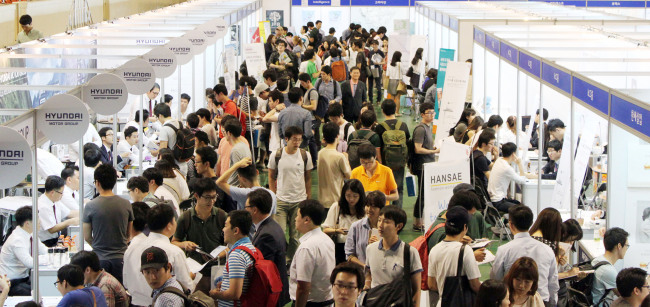Having completed a bachelor’s degree in business administration and psychology at a prestigious university and several internships in Korea and overseas, Ahn Ye-chan believed his future should be secure.
But the 27-year-old graduate’s confidence is quickly fading in the face of a tight job market, which has forced him to lower his expectations.
At a recent job fair, he could not find one position that could fulfill his dream of working in international business.
“There are few entry-level positions available for foreign companies here. Now I am broadening my options and also trying to apply to some major domestic companies,” he told The Korea Herald.
Ahn is the victim of a protracted slowdown, an industrial structure in which growth yields fewer jobs than before, and a disproportionally large number of university graduates in comparison to the new jobs available.
Amid a sluggish economy and lingering uncertainties, major companies are cutting down on spending and recruitment of new entry-level employees.
A survey of 916 companies by online job search site Incruit found that the entry-level openings at big firms are down 17.5 percent on-year.
A recent government report estimated that the nation’s 30 largest public companies would hire about 1,200 new employees later this year, down 26 percent from 1,641 a year ago.
The dismal job market is likely to have the most serious impact on new graduates, like Ahn, who want a job straight out of college.
“I already feel a lot of pressure about getting a job soon, and I don’t want to fall behind,” he said.
According to data by the Ministry of Education, of 555,142 students who completed college and graduate school in August 2012 and in February this year, only 59.3 percent landed a job immediately after graduation, slightly fewer than the 59.5 percent the previous year.
The figures did not include graduates who work part-time at their colleges and pursue postgraduate degrees.
Some schools even reportedly use fake employment numbers for the annual assessment by the Ministry of Education.
The ministry currently assesses the nation’s 337 tertiary educational institutions each year. And colleges ranked in the bottom 15 percent of the assessment are not able to receive financial support from the ministry the following year.
“One of crucial assessment criteria is employment of graduates. To survive the assessment, some schools make drastic moves,” a university worker said.
“The employment rate is a highly sensitive issue for all colleges here.”
The government keeps adding jobs, but data show they tend to be low-paying, part-time or both. Still, many college graduates hold out for a job in state-run companies or government offices.
Last month, more than 126,000 people took a test for 1,400 entry-level positions at the Seoul Metropolitan government, registering a record of 87.1 applicants for every vacancy.
“People say it’s a miracle to pass the test in a first go. I expect it will take one or two years at least to pass the test. But I want to keep pursuing the job because it is stable and comes with social security and a retirement pension,” a 25-year-old applicant told The Korea Herald.
Instead of looking for jobs, Park Tae-hoon, 25, a senior in Chinese language, launched his own business earlier this year.
“It seemed quite difficult to find a position that matches my major, so I decided to start my own business,” he said.
He rented office space for free with support from the Seoul city government and managed to launch a news search website. But starting up isn’t easy, he has found.
“The problem is not that I’m not making any money at the moment, but convincing people who think I started this because I couldn’t find a job,” he admitted.
The Education Ministry plans to strengthen entrepreneurship education for college students like Park and expand start-up infrastructure at universities.
For this, the ministry aims to raise the number of colleges offering entrepreneurship classes from the current 133 schools to 217 by 2017.
But critics still remain skeptical as young Koreans often avoid starting up companies due to the high risks and negative social perception.
“(Compared to previous years) students are less interested in starting up a business as they don’t like risk, and even if they show interest in a start-up, their family and friends try to dissuade them,” said Chung Dae-yong, a professor in the Department of Entrepreneurship and Small Business at Soongsil University.
More than 65 percent of college graduates want a job at a major firm or state-run company, while only 2.3 percent of students said they wanted to work in small or medium-sized business after their graduation this year, according to a study by researcher Oh Ho-young of the Korea Research Institute for Vocational Education and Training.
“Many graduates opt to remain unemployed rather than working at small businesses, as major companies consider applicants’ foreign language skills and their academic backgrounds over work experience,” he noted in the study.
Oh also pointed out that the rise in the youth unemployment rate is in line with the country’s increasing college attainment rate.
Nearly 71 percent, or 446,474, high school graduates went on to college this year, the highest proportion among advanced countries.
Yet only 50 percent of college graduates were employed full-time in 2013, creating problems such as an overqualified workforce, shortages of skilled labor and mismatches between job seekers and businesses.
“Too many students now go to college, and their expectation for future jobs is higher than ever. We need to tackle this structural problem, encourage students and create more jobs that don’t need a college degree,” he added.
By Oh Kyu-wook (
596story@heraldcorp.com)




![[Herald Interview] 'Trump will use tariffs as first line of defense for American manufacturing'](http://res.heraldm.com/phpwas/restmb_idxmake.php?idx=644&simg=/content/image/2024/11/26/20241126050017_0.jpg)

![[Health and care] Getting cancer young: Why cancer isn’t just an older person’s battle](http://res.heraldm.com/phpwas/restmb_idxmake.php?idx=644&simg=/content/image/2024/11/26/20241126050043_0.jpg)

![[Graphic News] International marriages on rise in Korea](http://res.heraldm.com/phpwas/restmb_idxmake.php?idx=644&simg=/content/image/2024/11/25/20241125050091_0.gif)